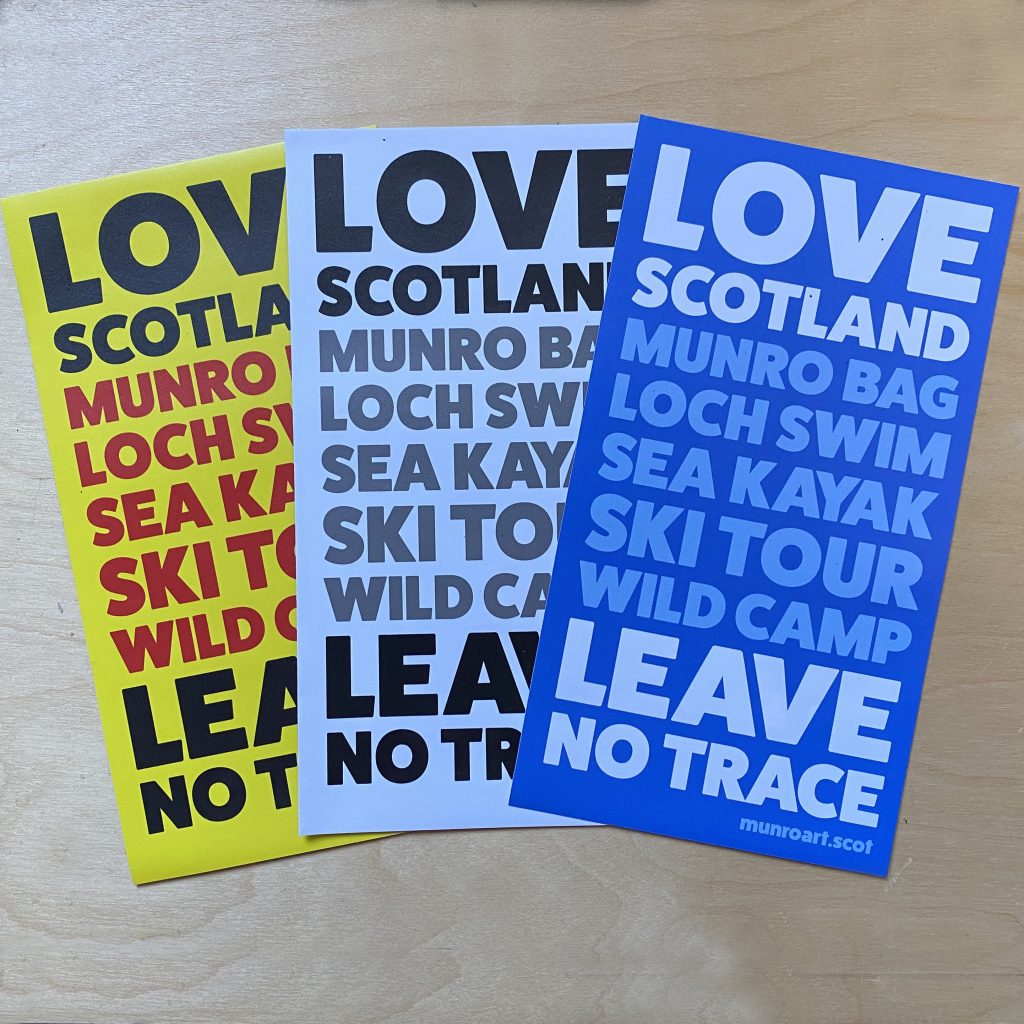
I feel passionately that those of us who enjoy the wilds of Scotland responsibly need to become more vocal. We have great freedoms to wild camp and explore all over our amazing landscape. Unfortunately the headlines are being grabbed by the irresponsible who leave litter and camping equipment, damage trees, scorch the earth with disposable BBQs and irresponsible fires, and to put it bluntly leave their crap and baby wipes for all to see.
If we do not promote widely the philiposphy and practice of ‘Leave No Trace’ understandably annoyed residents could push for bans on the activities we love the most.
I’ve created some stickers to get the message out there.

I’ve also added a few pointers on leaving no trace in a video, but there lots of great resources out there.
Mountaineering Scotland have this excellent guide to toileting outside.
https://www.mountaineering.scot/assets/contentfiles/pdf/where-to-go-leaflet.pdf
Here is some more detail based on an excellent US article on
https://www.rei.com/learn/expert-advice/leave-no-trace.html
Who Should Use the Leave No Trace Seven Principles?
While the Leave No Trace Seven Principles began as a guide for remote wilderness and backcountry users who generally camp overnight, the following guidelines apply to “frontcountry” users as well.
“Backcountry” areas are those most often accessed by overnight users like backpackers, while “frontcountry” refers to places easily accessed by car. Frontcountry is most often enjoyed by day-use visitors like dog walkers, picnickers and runners and those who are car camping.
The Leave No Trace Seven Principles
• Plan ahead and prepare.
• Travel and camp on durable surfaces.
• Dispose of waste properly.
• Leave what you find.
• Minimise campfire impacts (be careful with fire).
• Respect wildlife.
• Be considerate of other visitors.
Plan Ahead and Prepare
When you’re poorly prepared, you’re more likely to run into problems. Lack of good research can lead to situations where you can become fatigued or fearful, and you may be forced to make poor choices.
• Planning ahead includes doing research about your destination and packing appropriately.
• Know the regulations and special concerns for the area you’ll visit.
• Prepare for extreme weather, hazards and emergencies. The Scottish mountains can have extreme weather at all times of the year.
• Schedule your trip to avoid times of high use.
• Visit in small groups when possible. Consider splitting larger groups into smaller groups.
• Repackage food to minimise waste.
• Use a map and compass to eliminate the use of marking paint, rock cairns or flagging.
Travel and Camp on Durable Surfaces
When exploring your surroundings and setting up your picnic or overnight camp, seek out resilient types of terrain. Ideal durable surfaces include established trails and campsites, rock, gravel, dry grasses or snow.
In popular areas, frontcountry or backcountry:
• Concentrate use on existing trails and campsites.
• Keep campsites small. Focus activity in areas where vegetation is absent.
• Walk single file in the middle of the trail, even when it’s wet or muddy. Try to avoid the path just becoming wider and wider.
In pristine areas:
Disperse use to prevent the creation of campsites and trails.
Avoid places where impacts are just beginning.
Dispose of Waste Properly
This principle applies to everything from litter to human waste to rinse water.
• Pack it in, pack it out. Inspect your campsite and rest areas for trash or spilled foods. Pack out all trash, leftover food and litter. Always leave a place cleaner than you found it.
• Deposit solid human waste in holes dug 6 to 8 inches deep, at least 200 feet from water, camp and trails. Cover and disguise the hole when finished.
• Pack out toilet paper and hygiene products.
• To wash yourself or your dishes, carry water 200 feet away from streams or lakes and use small amounts of biodegradable soap. Scatter strained dishwater.
Minimise Campfire Impacts
While campfires are a timeless camping ritual, they can also be one of the most destructive ones. Far better choices include a lightweight stove for cooking and a candle lantern for light. Stargazing is an excellent alternative, and is best enjoyed when your campsite is in total darkness.
• Where fires are permitted, use established fire rings, fire pans or mound fires.
• Keep fires small. Use only sticks from the ground that can be broken by hand.
• Burn all wood and coals to ash, put out campfires completely, then scatter cool ashes.
• Don’t bring firewood from home, which could introduce new pests and diseases. Buy it from a local source or gather it responsibly where allowed.
• When kayaking build your fire below the high tide mark.
Leave What You Find
The adage “take only pictures, leave only footprints” still holds, although leaving fewer footprints is even better.
• Preserve the past: Examine, but do not touch, cultural or historic structures and artifacts.
• Leave rocks, plants and other natural objects as you find them, don’t make pretty stone piles!!
• Avoid introducing or transporting non-native species: Clean boot soles, kayak hulls and bike tires off between trips.
• Do not build structures, furniture or dig trenches.
Respect Wildlife
• Don’t approach animals. Both you and the wildlife will enjoy encounters more if you master the zoom lens on your camera and pack along a pair of binoculars.
• Observe wildlife from a distance. Do not follow or approach them.
• Never feed animals. Feeding wildlife damages their health, alters natural behaviours, and exposes them to predators and other dangers.
• Protect wildlife and your food by storing rations and trash securely.
• Control pets at all times, or leave them at home.
• Avoid wildlife during sensitive times: mating, nesting, raising young or winter.
Be Considerate of Other Visitors
“Treat others the way you would like to be treated” is a rule that applies in the outdoors, too.
• Respect other visitors and protect the quality of their experience.
• Be courteous. Yield to other users on the trail.
• Take breaks and camp away from trails and other visitors.
• Let nature’s sounds prevail. Avoid loud voices and noises. If you want to play music, these amazing things called headphones have been invented!
• Manage your pet.
